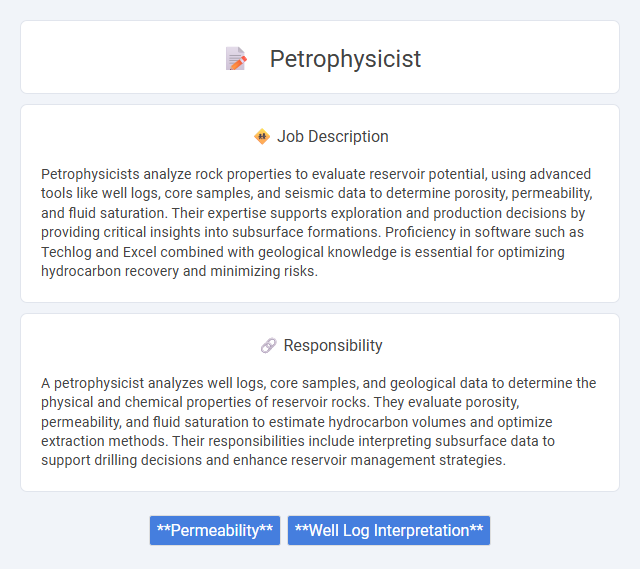
Petrophysicists analyze rock properties to evaluate reservoir potential, using advanced tools like well logs, core samples, and seismic data to determine porosity, permeability, and fluid saturation. Their expertise supports exploration and production decisions by providing critical insights into subsurface formations. Proficiency in software such as Techlog and Excel combined with geological knowledge is essential for optimizing hydrocarbon recovery and minimizing risks.
Individuals with strong analytical skills and a passion for geology are likely to find a career as a petrophysicist suitable. Those comfortable working with complex data and interpreting subsurface formations may thrive in this role. It is probable that candidates who enjoy detailed problem-solving and fieldwork could adapt well to the demands of the profession.
Qualification
A petrophysicist typically requires a Bachelor's degree in geology, geophysics, petroleum engineering, or a related field, with many employers preferring candidates who hold a Master's degree or Ph.D. Advanced knowledge of logging tools, reservoir characterization, and data interpretation software such as Petrel or Techlog is essential. Strong analytical skills, proficiency in seismic analysis, and experience with well log analysis are critical qualifications for effective reservoir evaluation and hydrocarbon exploration.
Responsibility
A petrophysicist analyzes well logs, core samples, and geological data to determine the physical and chemical properties of reservoir rocks. They evaluate porosity, permeability, and fluid saturation to estimate hydrocarbon volumes and optimize extraction methods. Their responsibilities include interpreting subsurface data to support drilling decisions and enhance reservoir management strategies.
Benefit
A Petrophysicist's role likely offers significant benefits such as competitive salaries and opportunities for career advancement within the oil and gas industry. The job may provide access to cutting-edge technology and diverse fieldwork experiences, enhancing professional skills. Employees might also enjoy comprehensive health benefits and job stability due to the ongoing demand for energy resources.
Challenge
The role of a petrophysicist likely involves analyzing complex subsurface data to accurately evaluate reservoir properties, presenting ongoing challenges in data interpretation and uncertainty management. Adapting to evolving technologies and integrating multidisciplinary information may require continuous learning and problem-solving. The position probably demands meticulous attention to detail and strong analytical skills to optimize resource extraction efficiently.
Career Advancement
Petrophysicists analyze rock properties to optimize hydrocarbon extraction, making expertise in rock physics and data interpretation crucial for career growth. Advanced skills in reservoir characterization, well logging, and software like Petrel enhance promotion prospects to senior or managerial roles. Continuous learning through certifications and industry conferences accelerates progression to leadership positions within oil and gas companies.
Key Terms
Permeability
A Petrophysicist specializes in analyzing rock properties to evaluate reservoir permeability, which directly influences fluid flow within subsurface formations. Accurate permeability measurements derived from core samples and well logs are critical for estimating hydrocarbon production potential and reservoir performance. Advanced petrophysical techniques enhance the interpretation of permeability variations, enabling optimized reservoir development and management strategies.
Well Log Interpretation
Well log interpretation is a critical task for petrophysicists, involving the analysis of electrical, acoustic, and nuclear logs to determine subsurface rock properties and fluid content. Accurate interpretation of gamma ray, resistivity, density, and neutron porosity logs enables the identification of hydrocarbon-bearing zones and reservoir characterization. Mastery in well log interpretation supports optimized drilling decisions and enhanced reservoir management, directly impacting exploration and production efficiency.
 kuljobs.com
kuljobs.com